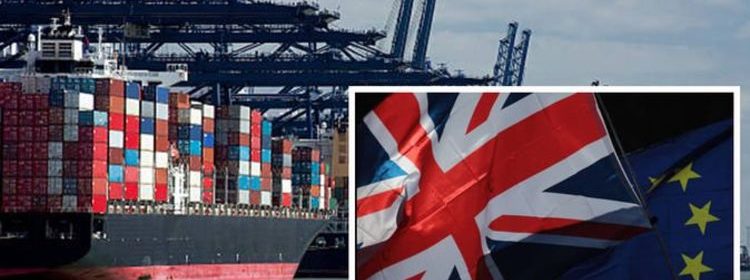How Brexit has affected UK trade: Major boost in non-EU deals

Netherlands cashing in on Brexit UK business flocks to EU
We use your sign-up to provide content in ways you’ve consented to and to improve our understanding of you. This may include adverts from us and 3rd parties based on our understanding. You can unsubscribe at any time. More info
A report released by the British government has revealed that trade with non-EU countries has benefitted from the UK’s exit from the European Union. Although it’s still too early to predict how trade will be impacted longer-term, the news will give hope to businesses who are concerned what a post-Brexit world could look like.
The ongoing Covid pandemic means that current UK trade levels still remain below those seen in early 2019.
Consequently, service imports and exports have decreased since the second quarter of 2019, with both EU and non-EU countries.
However, that hasn’t stopped altogether some changes emerging in how the UK trades, since it officially left the EU last December.
A report published by the Government has shown that both the proportion of total service exports and imports with non-EU countries, between 2019 and 2021, have increased.


The proportion of total service exports to non-EU countries increased from 61.9 percent, in Quarter 2 of 2019, to 64.6 percent for the same quarter this year.
In addition, the total service imports to non-EU countries increased from 52 to 61.8 percent.
Meanwhile, the report also found that between 2019 and 2021, service exports to the EU remained 20.3 percent lower than non-EU countries.
The report said service exports to non-EU countries were 10.5 percent lower.

Compared with the first quarter of this year – January to March – trade of exports in general increased by 2.1 percent.
This time though, the total services exported grew more sharply with EU countries (3.6 percent) compared with non-EU nations (1.3 percent).
Moreover, the same general growth can also be said for the total services imported in Quarter Two of 2021, which grew by 3.8 percent.
Once again this rate of increase was greater with the EU (7.9 percent) than with non-EU nations (1.5 percent).
DON’T MISS:
Trade Secretary eyes up £140bn bonanza in Brexit triumph [INSIGHT]
Brexit LIVE: Frost’s bid to ditch ECJ doomed to fail, warns Coveney [LIVE]
Unvaccinated MAPPED: The EIGHT areas where rates are highest [ANALYSIS]

As well as analysing how Brexit has affected British trade, the report also explored how the Covid pandemic is influencing the current situation.
Until the impacts of the Covid pandemic on trade are less pronounced, we won’t be able to see what long-term changes the UK’s exit from the EU leads to.
The document found that businesses reported more challenges relating to the Covid pandemic when exporting or importing services compared with goods.
For example, a third of businesses who reported challenges with exporting services blamed Covid, in contrast to seven percent of businesses who experienced challenges exporting goods only.
Why is trade being affected by Brexit?
The UK’s exit from the EU was officially confirmed on December 31 last year.
This was the day that marked the end of the EU transition period.
When the UK left the EU it meant that many of the existing trade deals the UK held were no longer in place, and thus had to begin the process of renegotiating deals with countries all over the world.
Source: Read Full Article
